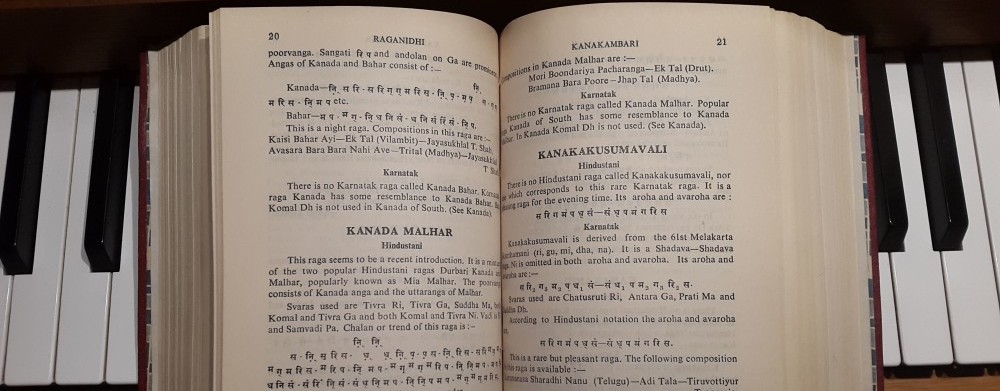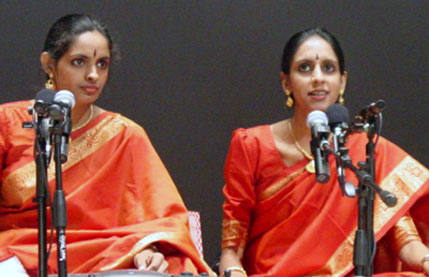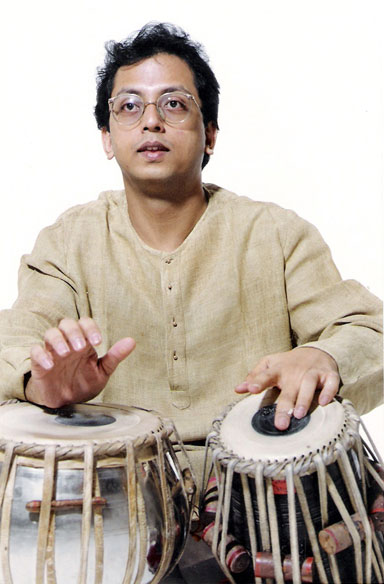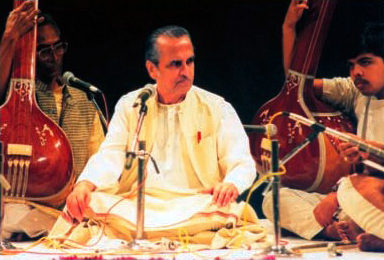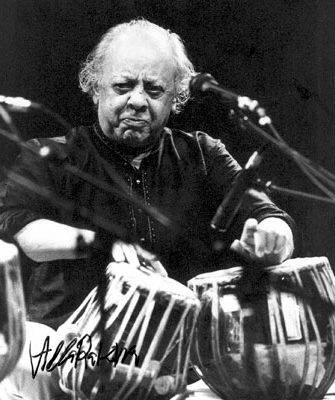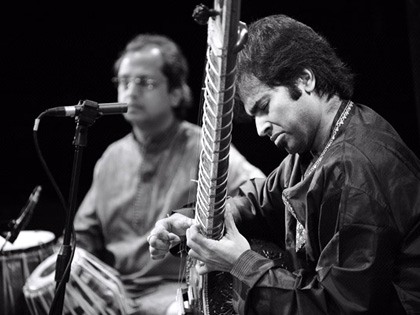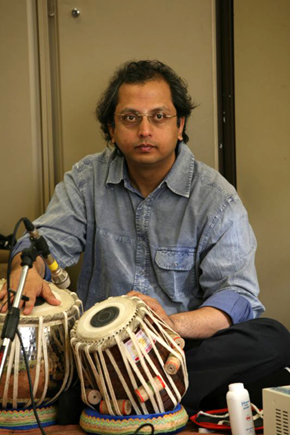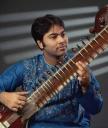
It’s been more than a week now that I’ve had a great time in Leicester, England, as a visitor of the Darbar Festival 2008. This year it was the third edition of the Festival. I’d heard already a lot of things about ‘Darbar’. Not only several people told me about it, but of course I had also listened to the music itself on many great ‘Darbar-albums’ released by Sense World Music in 2006 and 2007. But being there at the festival is the real thing of course, so I simply had to go to Leicester. What I got there was a unique musical experience and much more than I ever could’ve dreamed of.

participating artists of Darbar 2008 together on stage, at the closing of the festival (photo: Pieter de Rooij)
A knowledgeable, involved and dedicated audience
The Darbar Festival has some very special features and differs from any other festival of Indian classical music, except for, maybe, the Saptak Festival in India, that shares the same philosophy and views. During three days Darbar offers 15 concerts. I’ve attended 12 of them, and one Darbar-unplugged concert before the festival. Top artists from India and from the UK enter the stage. They perform not only for a very knowledgeable, involved and dedicated audience, but also for the other Darbar artists, so the artists visit each other’s concerts. This creates a very special, stimulating atmosphere for the artists on stage.

ragasinger Kaushiki Chakrabarty performing at Darbar Festival 2008 (photo: Arnhel de Serra)
In Amsterdam, here in Holland, I’ve been visiting ragaconcerts for more than 25 years, and it’s always been a really good and dedicated audience, but you’ll never find an atmosphere in Amsterdam comparable to the Darbar-audience, whose response to the artists -with gestures and vocal reactions- is -like in India- much more direct and spontaneous.

participating artists at the Darbar Festival 2008, poster 1
Bringing on stage a new generation of excellent young musicians
The programme schedule of Darbar is really exciting, with a very good selection of the very best young stars, combined with excellent young top performers who may well be on the verge of an international breakthrough. This doesn’t mean that the older artists with the ‘big reputation’ are not coming to Darbar. Some of them do perform at Darbar as well, but apparantly, for the organizers it’s not an issue, a must or a necessity to have them by all means at Darbar to make the festival a success. The great thing is that Darbar doesn’t focus obsessively on the older generation -like so many other venues and festivals do out of mere ‘safety’ or marketing reasons or, otherwise, wrong views- but is breaking away from this old fashioned idea that only old artists can offer the best in Indian classical music, which is simply untrue. As are other persistent ideas, that the spiritual element of the music is vanishing among younger performers and that their musical skills are not as good as the older generation. These persisting ideas -kept alive especially in the media and interconnected ‘markets’ around them- are not only wrong, but do also harm the viability of Indian classical music and could even endanger the continuation of this vulnerable, but nonetheless strong musical tradition. Ravi Shankar and Ali Akbar Khan… when did their stardom and their great reputation start? Exactly, almost fifty-five years ago! The media -and the majority of their users- tend to forget this and in so-doing create and perceive a wrong picture of Indian classical music, namely, as a musical domain exclusively dominated by old stars. This widespread misconception is courageously counteracted by Darbar -and for instance by the Sense World Music label- by bringing on stage a new generation of excellent young musicians.
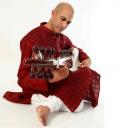
sarod player Tarun Jasani, one of the great young players at Darbar 2008 (photo: from Tarun Jasani’s website http://tarunjasani.com/ )
And that a younger generation can sometimes sound slightly different or seeks new ways of expressing themselves shouldn’t be a reason for immediate criticism -as so often unjustly occurs- but rather be seen as a consequence of music’s natural flow and evolution through time and history. Just think for example in this regard of Indian classical music’s development outside of the domain of royal courts, after 1947. The musicians had to face up new challenges to survive and keep the music alive. And what happened from there was marvellous, the performance-format that evolved -the modern ragaconcert- conquered a worldwide audience!

participating artists at the Darbar Festival 2008, poster 2
Unplugged concert
Now, who were playing at Darbar? Too many to name them all here, but there’s a programme schedule on the web and on the two posters above you can have a look at most of them (with all names listed on poster 1). I’d like to mention here a few of my personal highlights. On Wednesday 2nd of April, two days before the festival started, I was already in Leicester and visited a so-called ‘Darbar unplugged’-concert, in the Leicester Guildhall, a beautiful old medieval building, with an excellent performance venue. Playing there were two celebrities, Irshad Khan on sitar and surbahar, accompanied on tabla by Yogesh Samsi. Their great, inspired playing was very rewarding and pleasing to the ears, helped also by the excellent acoustics of the venue and the unplugged/unamplified sound of the instruments. The instruments sounded as natural as they should, evry colour and little detail could be heard.
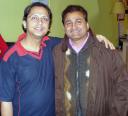
(tabla player Yogesh Samsi [left] and harmonium player Ajay Joglekar [right], meet on thursday April 3rd, 2008, in Leicester
(photo: Pieter de Rooij)
Exceptional performance by Kaushiki Chakrabarty
The Darbar Festival itself was from Friday 4th of April to Sunday 6th of April. The concerts I visited were all great, and four of them I consider my ‘personal favourites’: on friday morning Rakesh Chaurasia’s bansuri-concert with Yogesh Samsi on tabla, on saturday evening the tabla-soloconcert by Bhupinder Sing Chaggar (he’s from Leeds, UK), accompanied on harmonium by Ajay Joglekar and on sunday evening Purbayan Chatterjee’s sitarconcert with -once more- Yogesh Samsi, on tabla. And then there was in my opinion an exceptional festival highlight: the performance on saturday evening of 28-year old singer Kaushiki Chakrabarty from Calcutta, accompanied by Sanju Sahai on tabla and by Ajay Joglekar on harmonium. Soon after hitting the first notes of raag Abhogi right up until the very last note of a light classical song that ended Kaushiki’s concert, the whole audience was spellbound and completely immersed in her singing. I should mention in particular Kaushiki’s deeply moving rendition of a charmingly beautiful melody in raag Pahadi, strongly associated with nature and expressing a painful separation of lovers. There was maximum response -lively gestures, enthusiastic vocal reactions, numerous applauses- from the audience during the performance and a tumultuous applause afterwards.
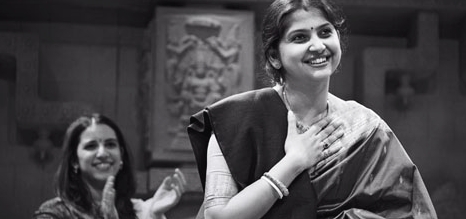
loud applause and cheers raining down on Kaushiki Chakrabarty after her breathtaking performance at Darbar 2008 (photo: Arnhel de Serra)
I’ve heard Kaushiki live before in a dazzling performance in Amsterdam and evrything else I’ve heard of her on cd has been no less than mindblowing. Now in Leicester it was even much, much more than that. Kaushiki’s Darbar-concert was truly the most profound and deeply touching musical experience I’ve ever had. Veeery exceptional!

(Kaushiki Chakrabarty after her performance at Darbar 2008, next to her tanpura-players Debipriya Das [left] and Ranjana Ghatak [right] (photo: Pieter de Rooij)
Interviews at Darbar for my upcoming programmes
So, Darbar was a great experience. I didn’t only visit concerts, but I also had the privilege to interview three great musicians during my stay in Leicester: Irshad Khan, Yogesh Samsi and Purbayan Chatterjee. I’ll portray them in three specials of my radioprogramme ‘Gharana’, later on this year. You’ll soon find more details on these programmes here on my weblog and on the website of De Concertzender.
HOME
